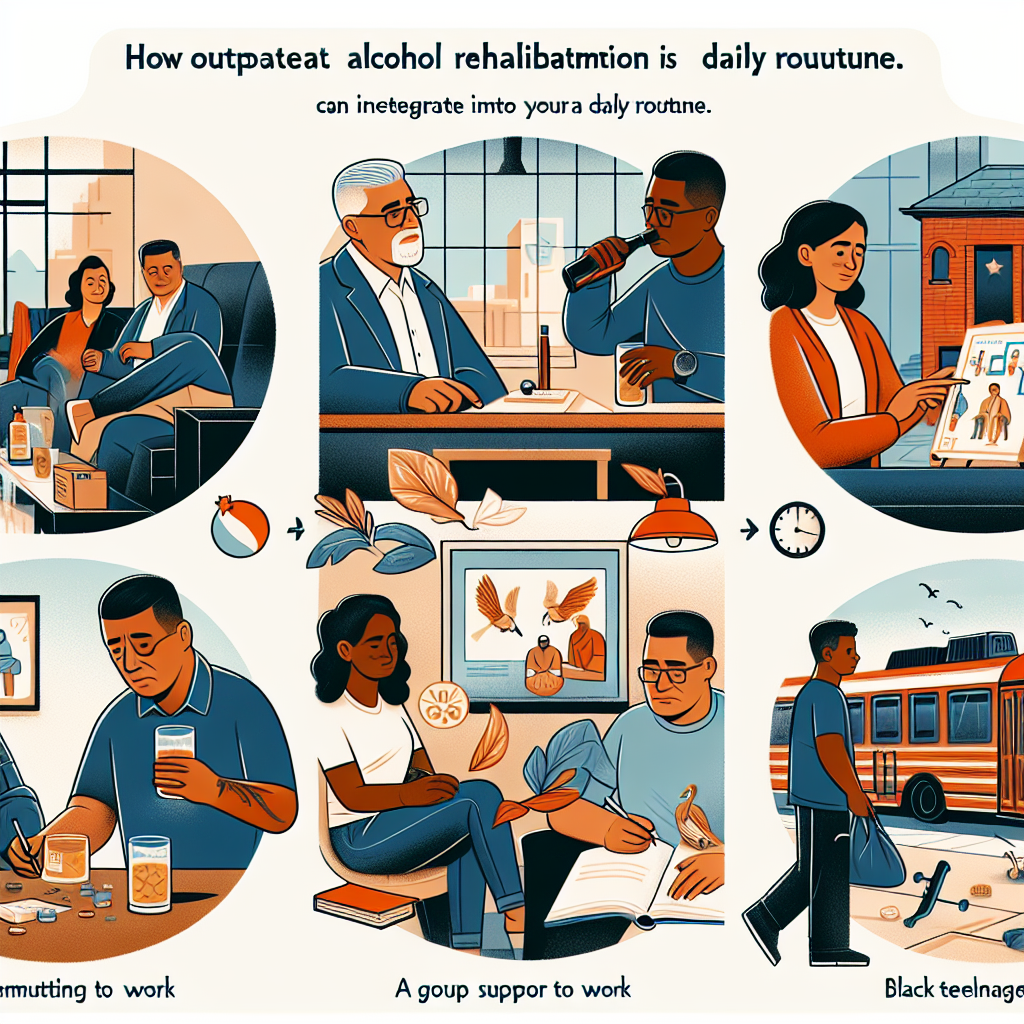-
Table of Contents

“Outpatient Alcohol Rehab: Recovery That Fits Your Life, Not Disrupts It.”
Introduction
Outpatient alcohol rehab offers a flexible and effective solution for individuals seeking to overcome alcohol dependency while maintaining their daily responsibilities. Unlike inpatient programs, outpatient rehab allows participants to live at home and continue working, attending school, or fulfilling family obligations. This approach provides access to professional counseling, group therapy, and medical support on a schedule that fits into one’s life, making it a practical option for those who need treatment but cannot commit to a residential program. By integrating recovery into everyday routines, outpatient rehab helps individuals build sustainable habits and a support network within their own community, fostering long-term sobriety and personal growth.
Balancing Work and Recovery: How Outpatient Alcohol Rehab Can Fit into Your Busy Schedule
Balancing work and recovery can seem like an insurmountable challenge, especially when dealing with the complexities of alcohol addiction. However, outpatient alcohol rehab offers a flexible and effective solution that can seamlessly fit into your busy schedule. This approach allows individuals to receive the necessary treatment while maintaining their professional and personal responsibilities, making it an ideal option for those who cannot afford to take extended time off from work or family duties.
One of the primary advantages of outpatient alcohol rehab is its flexibility. Unlike inpatient programs that require a full-time commitment, outpatient rehab allows you to attend therapy sessions and support groups during evenings or weekends. This means you can continue to fulfill your work obligations and maintain your daily routine while receiving the support you need to overcome addiction. By integrating treatment into your existing schedule, outpatient rehab minimizes disruption to your life, making it easier to commit to the recovery process.
Moreover, outpatient rehab provides a supportive environment that encourages accountability and personal growth. Regular therapy sessions, whether individual or group-based, offer a safe space to discuss challenges, share experiences, and develop coping strategies. These sessions are designed to fit into your schedule, ensuring that you can consistently attend without compromising your work or family commitments. The ongoing support from therapists and peers can be incredibly motivating, helping you stay focused on your recovery goals while managing your daily responsibilities.
In addition to therapy, outpatient programs often include educational workshops and skill-building activities that can be scheduled around your availability. These sessions cover a range of topics, from stress management and healthy lifestyle choices to relapse prevention techniques. By participating in these activities, you can gain valuable insights and practical tools that will aid in your recovery journey. The knowledge and skills acquired during these sessions can be directly applied to your work and personal life, enhancing your overall well-being and productivity.
Another significant benefit of outpatient alcohol rehab is the opportunity to apply what you learn in real-time. Since you remain in your home environment, you can immediately practice the coping mechanisms and strategies discussed in therapy. This real-world application reinforces learning and helps you build resilience in the face of everyday challenges. Balancing work and recovery becomes more manageable as you develop a stronger sense of self-efficacy and confidence in your ability to maintain sobriety.
Furthermore, outpatient rehab fosters a sense of community and connection, which is crucial for long-term recovery. Engaging with others who are on a similar journey can provide a sense of camaraderie and mutual support. These connections can be a source of inspiration and encouragement, reminding you that you are not alone in your struggles. The shared experiences and collective wisdom of the group can offer new perspectives and solutions, enriching your recovery process.
Ultimately, outpatient alcohol rehab is designed to be adaptable, making it possible to balance work and recovery effectively. By offering flexible scheduling, ongoing support, and practical tools, outpatient programs empower individuals to take control of their recovery without sacrificing their professional and personal responsibilities. Embracing this approach can lead to a healthier, more fulfilling life, where sobriety and success coexist harmoniously. With the right support and commitment, it is entirely possible to achieve lasting recovery while maintaining a busy schedule.
Family First: Integrating Outpatient Alcohol Rehab into Your Daily Life Without Disruption
Balancing the demands of daily life while seeking help for alcohol addiction can seem daunting, but outpatient alcohol rehab offers a flexible and effective solution that integrates seamlessly into your routine. This approach allows individuals to receive the necessary support and treatment without the need to put their lives on hold. By choosing outpatient rehab, you can continue to fulfill your responsibilities to your family, work, and other commitments, all while making significant strides toward recovery.
One of the primary advantages of outpatient alcohol rehab is its flexibility. Unlike inpatient programs that require a residential stay, outpatient rehab allows you to attend therapy sessions and support groups at times that fit your schedule. This means you can maintain your job, attend to family obligations, and participate in social activities, all while receiving the treatment you need. This flexibility is particularly beneficial for parents who need to be present for their children or for individuals who cannot afford to take extended leave from work.
Moreover, outpatient rehab provides a supportive environment that encourages the involvement of family members in the recovery process. Family therapy sessions are often a key component of outpatient programs, helping to rebuild trust and improve communication within the family unit. This collaborative approach not only strengthens familial bonds but also creates a robust support system that can significantly enhance the recovery journey. By involving loved ones in the process, you can foster a sense of accountability and encouragement that is crucial for long-term success.
Transitioning into outpatient rehab also allows you to apply the skills and strategies you learn in real-time. As you navigate your daily life, you can immediately implement coping mechanisms and relapse prevention techniques taught during therapy sessions. This real-world application helps to reinforce new behaviors and thought patterns, making them more sustainable in the long run. Additionally, being in your familiar environment while undergoing treatment can provide a sense of comfort and normalcy, which can be incredibly reassuring during the challenging moments of recovery.
Furthermore, outpatient rehab often includes a variety of therapeutic modalities tailored to meet individual needs. From cognitive-behavioral therapy (CBT) to motivational interviewing and holistic approaches like mindfulness and yoga, these programs offer diverse tools to address the root causes of addiction and promote overall well-being. This personalized care ensures that you receive the most effective treatment for your unique situation, enhancing the likelihood of a successful recovery.
Another significant benefit of outpatient rehab is the opportunity to build a local support network. By participating in community-based support groups and therapy sessions, you can connect with others who are facing similar challenges. These connections can provide invaluable emotional support, practical advice, and a sense of camaraderie that can be incredibly motivating. Knowing that you are not alone in your journey can make a profound difference in your outlook and determination to overcome addiction.
In conclusion, outpatient alcohol rehab offers a practical and empowering way to integrate recovery into your daily life without causing major disruptions. Its flexibility, family involvement, real-time application of skills, personalized care, and community support make it an ideal choice for those seeking to balance their responsibilities while pursuing sobriety. By choosing outpatient rehab, you can take control of your life, strengthen your relationships, and build a healthier, more fulfilling future. Remember, the journey to recovery is a step-by-step process, and with the right support and determination, you can achieve lasting change.
Q&A
1. **Question:** How can outpatient alcohol rehab accommodate a busy work schedule?
**Answer:** Outpatient alcohol rehab often offers flexible scheduling, including evening and weekend sessions, allowing individuals to attend treatment while maintaining their work commitments.
2. **Question:** What are the benefits of outpatient alcohol rehab for family life?
**Answer:** Outpatient alcohol rehab allows individuals to live at home, enabling them to maintain family responsibilities and support systems while receiving treatment.
Conclusion
Outpatient alcohol rehab can seamlessly integrate into your life by offering flexible scheduling that allows you to maintain work, family, and social responsibilities while receiving treatment. It provides a supportive environment with access to therapy, counseling, and medical care without the need for residential commitment, making it a practical and effective option for those seeking recovery while continuing their daily routines.



